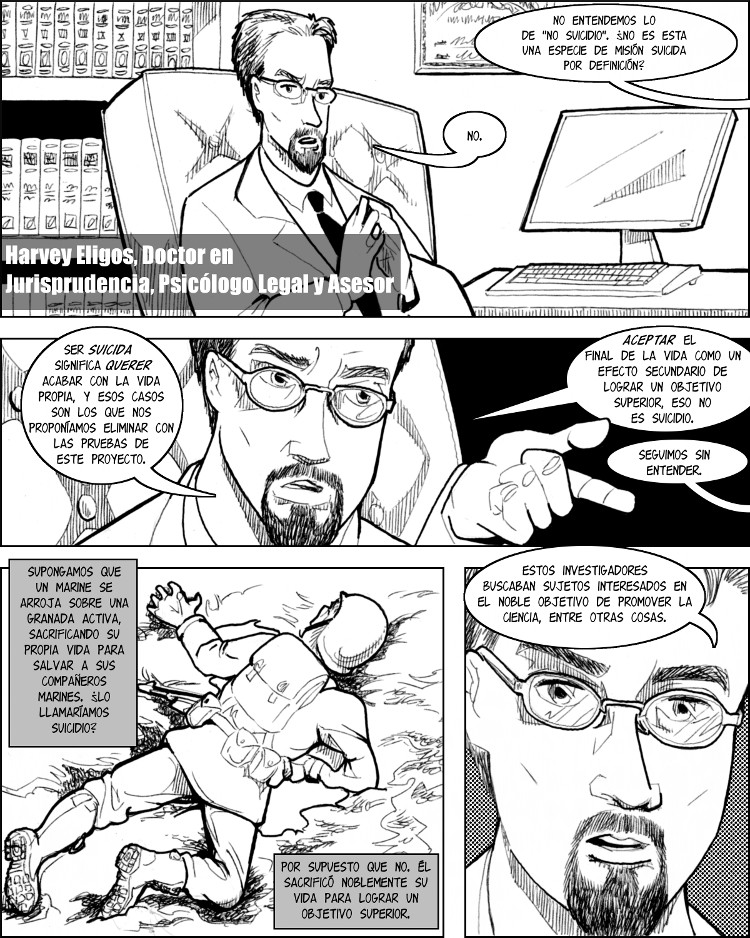
This work is licensed under a Creative Commons Attribution-NonCommercial-ShareAlike 4.0 International License.
PAGE 31 (Four panels)
Panel 1: HARVEY ELIGOS (“Eligos”), an elegant-looking man with a neatly trimmed Van Dyke beard and an expensive suit, sits across a polished wooden conference table in a conference room of a high-priced law firm. He is being interviewed. He looks and in control of his situation.
Unseen interviewer (1): We don’t understand about “non-suicidality.” Isn’t this a sort of suicide mission by definition?
Translation (1): No entendemos lo de “no suicidio”. ¿No es esta una especie de misión suicida por definición?
Eligos (2): No.
Translation (2): No.
SUBTITLE (3): Harvey Eligos, J.D., Ph.D., legal psychologist and consultant.
Comment (3): I’m adding a comment because the meaning of Eligos’s postitial letters might not be obvious in all contexts. “J.D.” stands for juris doctor and represents the terminal degree awarded by most America law schools after a three-year course of study, In most American states, it is a prerequisite for taking a bar examination thus for being licensed to practice law. “Ph.D.” is short for philosophiae doctor and is a terminal degree awarded in American universtities for completion of a program of advanced graduate study in an academic field and is generally regarded a prerequisite for a permanent appointment teaching in a university.
Translation (3): Harvey Eligos, doctor en jurisprudencia, psicólogo legal y asesor.
Panel 2: Harvey, still in control, continuing his response to the interviewer.
Eligos (4): To be suicidal means wanting to end one’s life, and that’s what the testing on this project was meant to screen out.
Translation (4): Ser suicida significa querer acabar con la vida propia, y esos casos son los que nos proponíamos eliminar con las pruebas de este proyecto.
Eligos (5): Accepting the end of one’s life as a side-effect of achieving a higher goal, that’s not suicide.
Translation (5): Aceptar el final de la vida como un efecto secundario de lograr un objetivo superior, eso no es suicidio.
Unseen interviewer (6): We still don’t understand.
Translation (6): Seguimos sin entender.
Panel 3: View of a dead United States Marine (WWII era), lying face down in the mud, his rifle and various battle detritus strew about his corpse.
CAPTION – ELIGOS NARRATING (7): Suppose a Marine throws himself on a live grenade, sacrificing his own life to save those of his fellow Marines. Would we call that a suicide? Of course not. He nobly sacrificed his life to achieve a higher goal.
Comment (7): “A Marine,” that is a member of the United States Marine Corps, a land-combat branch of the United States Navy.
Translation (7): Supongamos que un marine se arroja sobre una granada activa, sacrificando su propia vida para salvar a sus compañeros marines. ¿Lo llamaríamos suicidio? Por supuesto que no. Él sacrificó noblemente su vida para lograr un objetivo superior.
Panel 4: Close-up on Eligos’s face.
Eligos (8): These researchers were looking for subjects interested in the higher goal of advancing science, among other things.
Translation (8): Estos investigadores buscaban sujetos interesados en el noble objetivo de promover la ciencia, entre otras cosas.
![]()
![]()
![]() Carnada (Español/Versión de página larga)
Carnada (Español/Versión de página larga)
Carnada (Español/Versión deslizante)

